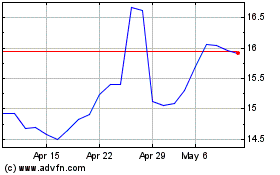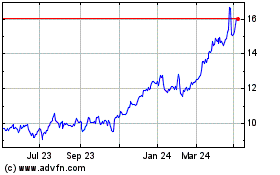Deutsche Bank Posts 3Q Loss as Restructuring Bites -- Update
October 30 2019 - 3:44AM
Dow Jones News
By Jenny Strasburg and Pietro Lombardi
Deutsche Bank AG's global overhaul has taken another big bite,
with the German lender reporting a second consecutive quarterly
loss as it exits businesses and absorbs restructuring costs.
The bank Wednesday reported a EUR832 million ($924 million)
third-quarter net loss, including a EUR1 billion pretax loss in the
new division where it has stashed businesses and positions it is
selling or winding down, called the Capital Release Unit.
Overall net revenue fell 15% to EUR5.3 billion.
The results missed expectations according to a consensus
forecast provided by FactSet.
Analysts had expected a third-quarter loss of about EUR772
million, while revenue had been forecast at EUR5.53 billion,
according to FactSet.
Deutsche Bank said its four core business divisions, including
its investment- and corporate-banking units and asset management,
were all profitable. Excluding the so-called bad-bank loss, those
core operations collectively had a pretax profit of EUR353 million
in the third quarter.
Chief Executive Christian Sewing said the bank's transformation
is on track, with a stable capital cushion, loan growth and
increase in assets being managed for clients. The bank said it is
also on track to meet its 2019 cost target.
The lender's head count has fallen below 90,000 for the first
time since it acquired German retail-banking business Postbank, it
said. In early July, Deutsche Bank unveiled a big revamp including
around 18,000 job cuts over several years and a retreat from some
of its global trading ambitions.
In late July it reported a big, but expected, second-quarter net
loss tied to restructuring costs. Drops in trading and
investment-banking revenue didn't help. That EUR3.15 billion
quarterly loss included a EUR3.4 billion restructuring charge.
The latest results reflect almost a full quarter of
post-overhaul reality. Germany's biggest lender faces years of
challenges cutting costs while maintaining enough profit to pay for
its restructuring, without depleting too much of the capital buffer
it needs to absorb potential losses and satisfy regulators.
In the reorganized investment bank, fixed-income sales and
trading revenue fell 13% in the third quarter, while origination
and advisory revenue increased 20%. Corporate-bank revenue was up
6%, including an 8% increase in transaction-banking revenue.
Overall private-bank and asset-management revenues were down 3% and
4%, respectively.
Mr. Sewing has said the upfront restructuring pain will make
Deutsche Bank leaner and more focused on serving European companies
at home and abroad. The bank has largely exited from equities
trading and pulled back from other money-losing operations with the
aim of focusing on long-term strengths, such as managing companies'
cash and financing trade.
But executives have also acknowledged that investors have heard
many restructuring promises before, only to be disappointed when
cuts failed to bring stability. The bank, which is almost 150 years
old, has had years of senior management turmoil and lost top
bankers. Investors aren't easily convinced that the latest plan
will succeed, either, analysts say.
Banks globally are suffering from low or negative interest
rates, with that prolonged weight on profits exacerbating Deutsche
Bank's already low-margin retail market in Germany.
Write to Jenny Strasburg at jenny.strasburg@wsj.com and Pietro
Lombardi at Pietro.Lombardi@dowjones.com
(END) Dow Jones Newswires
October 30, 2019 03:29 ET (07:29 GMT)
Copyright (c) 2019 Dow Jones & Company, Inc.
Deutsche Bank (TG:DBK)
Historical Stock Chart
From Mar 2024 to Apr 2024

Deutsche Bank (TG:DBK)
Historical Stock Chart
From Apr 2023 to Apr 2024
